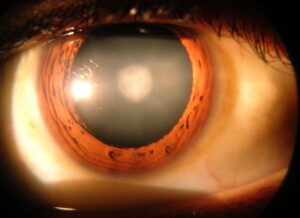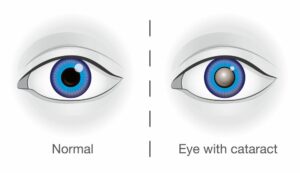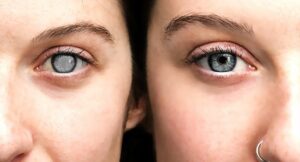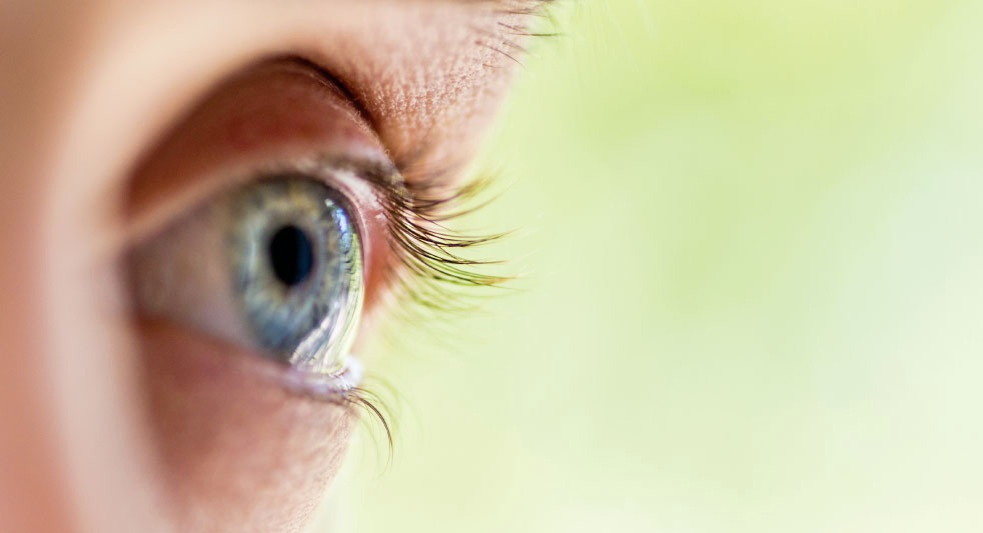A stellate cataract is a type of cataract that is very similar to a rosette cataract type. It is generally associated with blunt or injured trauma to the eye. The condition is characterized by a white, star-shaped structure in the visual axis of the lens and may appear more prominent in bright light. If you are experiencing any of these symptoms, it is important to see your optometrist for a diagnosis and treatment plan. In this blog post, we will discuss what causes stellate cataracts, how they are treated, and some tips for managing them.
Contents
What Is a Stellate Cataract?
 The stellate cataract is a type of rosette cataract, where the center of the lens is usually clear, with a surrounding ring of cloudy material. This can be caused by blunt injury or trauma, or it can occur naturally with age. A stellate cataract is typically easy to diagnose because the rosette pattern is clearly visible on an eye exam.
The stellate cataract is a type of rosette cataract, where the center of the lens is usually clear, with a surrounding ring of cloudy material. This can be caused by blunt injury or trauma, or it can occur naturally with age. A stellate cataract is typically easy to diagnose because the rosette pattern is clearly visible on an eye exam.
In fact, it is believed that the rosette pattern of a stellate cataract can worsen over time, leading to more significant vision impairment. You should not avoid or delay seeking medical attention if you notice a rosette pattern in your vision.
What Are Some Signs And Symptoms?
It is important to know about the signs and symptoms of a stellate cataract so you can recognize it early and seek proper treatment. Common signs and symptoms may include:
- Blurred vision: This is the most common symptom of a stellate cataract and can vary in degree, from mild to severe.
- Glare: Glare can also be a sign of a stellate cataract as it is caused by light reflecting off of the abnormally shaped lens. This can make it difficult to drive or read at night and may require the use of sunglasses with special lens coatings.
- Sensitivity to light: Increased sensitivity to bright lights may be a sign of a stellate cataract, as well as double vision or halos around lights.
- Halos around lights: It is a sign which can occur when the light hit the abnormal shape lens.
- Double vision: This is another symptom of a stellate cataract and can occur when the eye cannot properly focus light due to the abnormal lens.
These symptoms may indicate that a person has a stellate cataract. However, it is important to speak with an eye doctor to confirm the diagnosis. Because there are other possible causes of these symptoms. It is important to have a comprehensive eye exam if any of these signs and symptoms are present.
What Are Some Causes And Risk Factors?
 As the causes of stellate cataracts are not fully understood, the risk factors for developing them are not entirely clear. One of the common causes is trauma or injury to the eye. Which can damage the lens and trigger the formation of a cataract. The risk increases with age, as well as if you have a family history of cataracts.
As the causes of stellate cataracts are not fully understood, the risk factors for developing them are not entirely clear. One of the common causes is trauma or injury to the eye. Which can damage the lens and trigger the formation of a cataract. The risk increases with age, as well as if you have a family history of cataracts.
Other potential risk factors might include:
- Smoking
- Diabetes
- Excessive alcohol consumption
- Prolonged exposure to ultraviolet (UV) light
- Long-term use of certain medications, such as steroids or diuretics
All in all, these risk factors can vary from person to person. So it is best to speak with an optometrist or ophthalmologist about your particular risk profile. However, it is important to note that there are treatments available to help in managing the effects of a stellate cataract.
How Is It Diagnosed?
The diagnosis of a stellate cataract is made clinically by an ophthalmologist. During the eye exam, they will look for signs of increased opacity in the lens. As well as any changes in vision or light sensitivity that could be associated with this condition.
Depending on the severity of the condition, imaging techniques such as ultrasound or CT scans may be used to further evaluate the lens. For example, if a person is experiencing changes in vision, these imaging techniques can be used to determine the exact location of the opacity within the lens. And whether it is affecting any other structures.
With an accurate diagnosis and an understanding of the severity of the condition, a treatment plan can be developed to manage it.
What Are The Treatment Options?
 The primary treatment for a stellate cataract is surgery. This involves removing the existing damaged lenses and replacing them with intraocular lenses that are specifically designed to address this condition.
The primary treatment for a stellate cataract is surgery. This involves removing the existing damaged lenses and replacing them with intraocular lenses that are specifically designed to address this condition.
The procedure of the surgery is relatively simple and is usually done on an outpatient basis. During the procedure, a small incision is made in the eye to allow access to the replacement lens. The new lens will help restore vision to its normal level.
In some cases, medications can be prescribed to help reduce inflammation or slow down the progression of the cataract. However, these medications are typically used in combination with surgery for best results. As this can be a progressive condition, regular follow-ups with your doctor are important part.
There are also lifestyle changes that can be made to help manage a stellate cataract. These include:
- Avoiding exposure to strong sunlight
- Wearing protective eyewear when outdoors
- Quit smoking
- Eating a healthy diet rich in antioxidants may also be beneficial
These are all things you can do to help manage a stellate cataract. And reduce your risk of further vision loss. Be sure to talk with your doctor about the best approach for your particular condition.
Conclusion
In a nutshell, this type of cataract stellate cataract is a progressive condition that can lead to vision impairment if left untreated. That’s why it’s important to get regular eye exams and watch for any signs of vision problems. If you have any questions or concerns about this type of cataract. Be sure to discuss them with your doctor or optometrist.
Ultimately, with proper management and lifestyle changes, you can improve your vision and prevent further problems!
Cataract surgery is a safe and painless procedure. At MantraCare we have a team of experienced eye surgeons, who will be happy to answer any questions on cataract surgery. Call us at +91-9711116605 for any inquiries.
